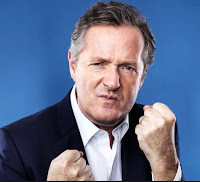Russian journalist Arkady Babchenko at a press conference after revealing that his 'murder' had been faked in order to expose a suspected attempt on his life in Ukraine, as reported by BBC News: "I have buried many friends and colleagues many times and I know the sickening feelingI am sorry you had to experience it. But there was no other way."
Frank Gardner, BBC security correspondent: "There can be few more glaring examples of 'fake news' than the deliberate misreporting by a sovereign government of a prominent journalist's death. Russia already denies any involvement in the attempted assassination of its former spy Sergei Skripal in the UK city of Salisbury in March, calling it fake news. It will now likely seize on this deception in Kiev to strengthen its claim in that case, and in others."
Lindsey Hillsum @lindseyhilsum on Twitter: "So now every time a journalist is murdered, those responsible will unleash their bots and propagandists to say it’s fake news. Thanks, Ukrainian security services. That’s really helpful to all who care about journalists’ safety. #Babchenko"
James Cusick on Open Democracy: "London’s Evening Standard newspaper, edited by the former chancellor George Osborne, has agreed a £3 million deal with six leading commercial companies, including Google and Uber, promising them “money-can’t-buy” positive news and “favourable” comment coverage."
A spokesman for ESI Media told Open Democracy:“The allegations about the Evening Standard are baseless and wrong. We would never offer ‘positive news’ coverage and ‘favourable’ comment as part of a commercial deal. The Evening Standard’s editorial integrity and independence is always at the heart of everything we do and is beyond question. That’s why we have such a big and loyal readership. No commercial agreement would ever include ‘favourable’ news coverage. Like all British newspapers, the Evening Standard has valued commercial partners and works with them on specific campaigns for the benefit of our readers. Indeed, editorial independence is and remains guaranteed in the contracts we sign.”
The Times [£] in a leader: "Since this newspaper exposed the Oxfam scandal, Save the Children has been accused of spending £100,000 on lawyers in an attempt to shut down reporting of harassment allegations against two of its former senior executives. The charity has been active in its internal reporting of abuse allegations, but the breach of trust the entire sector must repair is external — with donors, governments and above all those it exists to help. They deserve nothing less than full accountability."
Donald Trump on Twitter: "The Failing @nytimes quotes “a senior White House official,” who doesn’t exist, as saying “even if the meeting were reinstated, holding it on June 12 would be impossible, given the lack of time and the amount of planning needed.” WRONG AGAIN! Use real people, not phony sources."
The New York Times @nytimes on Twitter: "President Trump falsely accused The New York Times on Saturday of making up a source in an article about North Korea, even though the source was in fact a senior White House official speaking to a large group of reporters in the White House briefing room."
Jewish Chronicle editor Stephen Pollard on why he's back on Twitter: "Decided to dip my toe back in the Twitter water (as some people told me I would!). I hadn't realised you can set your mentions to block anyone you don't follow. Should make for an altogether more pleasant experience. And satisfyingly the screamers will be whistling in the wind."
Nick Cohen in the Observer on top law firms in the UK working for wealthy oligarchs: "One day, the security and intelligence services will have to ask when law firms that seek the lucrative business of repressive states and organisations, or threaten investigative journalists, become a threat to the national interest."
The Times [£] in a leader on Elon Musk: "His patience snapped this week in a series of tweets denouncing the “holier-than-thou hypocrisy” of “big media companies who lay claim to the truth but publish only enough to sugarcoat the lie”. Few journalists know much about electric powertrains. Equally, there are gaps in Mr Musk’s understanding of journalism. It is to get at truth, which by its nature is often inconvenient. This can require patience, bloody mindedness and the sort of resources available to “big media companies”, like the one that owns The Times. Serious journalism has to fend off plenty of baseless but damaging attacks as it is. The thin-skinned Mr Musk has better things to do than add to them just because he is going through a rough patch."
Jewish Chronicle editor Stephen Pollard on why he's back on Twitter: "Decided to dip my toe back in the Twitter water (as some people told me I would!). I hadn't realised you can set your mentions to block anyone you don't follow. Should make for an altogether more pleasant experience. And satisfyingly the screamers will be whistling in the wind."
Polly Toynbee in the Guardian on the Observer columnist Katharine Whitehorn who is suffering from Alzheimer’s: "This is a terrible thing to write – but I know that the old Katharine Whitehorn, the wittily honest Observer writer, would not have flinched. That’s what her two loving sons say and they want it written the way she would have. Her friends and former colleagues have been told, yet it may appal some lifelong admirers to have it said out loud. But her ability to confront hard truths and break old ideas of decorum is the reason so many read her for decades. With her usual no-nonsense rationality, she wrote with fearless clarity on the end of life. Katharine is now 90, living in a care home, suffering from Alzheimer’s, with little understanding left, no knowledge of where she is or why. She often doesn’t recognise people, can no longer read and curiously sometimes talks in French, not a language she knew particularly well: she will never read or understand this article. In other words, she is not herself. Her old self would not recognise herself in this other being who sits in the care home dayroom. What or who she has become is a difficult philosophical question, but she is no longer Katharine Whitehorn as was."
The Times [£] in a leader on Elon Musk: "His patience snapped this week in a series of tweets denouncing the “holier-than-thou hypocrisy” of “big media companies who lay claim to the truth but publish only enough to sugarcoat the lie”. Few journalists know much about electric powertrains. Equally, there are gaps in Mr Musk’s understanding of journalism. It is to get at truth, which by its nature is often inconvenient. This can require patience, bloody mindedness and the sort of resources available to “big media companies”, like the one that owns The Times. Serious journalism has to fend off plenty of baseless but damaging attacks as it is. The thin-skinned Mr Musk has better things to do than add to them just because he is going through a rough patch."
Gary Lineker @GaryLineker on Twitter: "Unique to this country to attempt to destroy our players morale before a major tournament. It’s weird, unpatriotic and sad."
Oliver Kay in The Times [£]: "Lineker’s contention was that this is all a bid to undermine England’s forthcoming World Cup campaign. Sorry Gary, but that does not add up. As was confirmed by a subsequent post on Lineker’s timeline — reminders of front-page headlines labelling the Manchester City forward “obscene” for “showing off blinging house”, of him being described as “footie idiot”, “greedy” and “Prem rat”, and even the inoffensive, if totally trivial, stories about a multi-millionaire buying his batteries from Poundworld or “queuing for pasties and sausage rolls” at Greggs — the timing was not a factor. World Cup on the horizon or not, Sterling can barely break wind without making headlines. That is the reality facing many of the Premier League’s biggest stars in 2018, their lives — their spending habits, their homes, their cars, how they spend their days off and their holidays, and particularly their partners — are a source of peculiar fascination to sections of the media and the public who are interested in footballers but not football."
Piers Morgan @piersmorgan on Twitter: "Remember, most top footballers sell interviews & books etc to tabloid newspapers & magazines all the time (I know, I used to write the cheques!). It’s a 2-way publicity street that benefits both sides very profitably. So let’s stop this ‘Leave them alone!’ bullsh*t..."
[£]=pawall















No comments:
Post a Comment